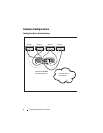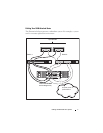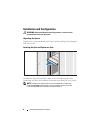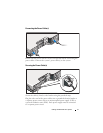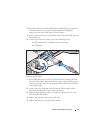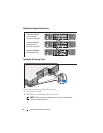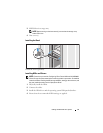
Getting Started With Your System
3
Before You Begin
NOTE:
Throughout the document, Dell PowerVault MD3600f series storage
array refers to both Dell PowerVault MD3600f and Dell PowerVault MD3620f.
Dell PowerVault MD1200 series expansion enclosure refers to both
Dell PowerVault MD1200 and Dell PowerVault MD1220.
Before setting up your PowerVault MD3600f series storage array, you must
consider certain best practices to ensure that your storage array operates at
maximum efficiency and offers full redundancy (if required).
• To enable redundancy, two Fibre Channel (FC) host bus adapters (HBA)
must be connected from the host system to the storage array. If
redundancy is not required, only one FC HBA is connected to the storage
array. See the
Support Matrix
for a list of supported HBAs and
Configuring
Fibre Channel With the Dell MD3600f Series Storage Array
for information
about installing HBA drivers. You can download both documents from
support.dell.com/manuals
.
• Before connecting any cables between the host server and storage array,
physically label each port and connector.
• Always follow proper power-up and power-down procedures when cycling
power across the network. You must also ensure that critical network
components are on separate power circuits.
Working With SFP Modules and Fiber Optic Cables
NOTE:
SFP+ modules are supported for 8 GB Fibre Channel connections.
This document refers to SFP generically.
Each storage controller can have up to four FC host ports. A small-form-factor
pluggable (SFP) module is used to connect a host port to a host or switch.
The SFP module is inserted into the port, and then a fiber optic cable is
inserted into the SFP module. The other end of the fiber optic cable is
connected to an optical interface connector either in a FC HBA on a host or
a switch. SFP modules are laser products.
WARNING:
Data processing environments can contain equipment transmitting
on system links with laser modules that operate at greater than Class 1 power
levels. Never look into the end of an optical fiber cable or open receptacle.










